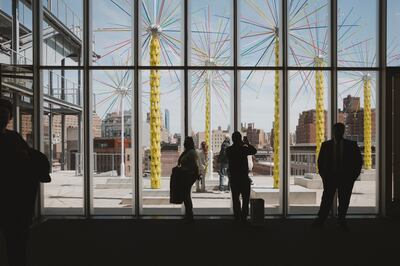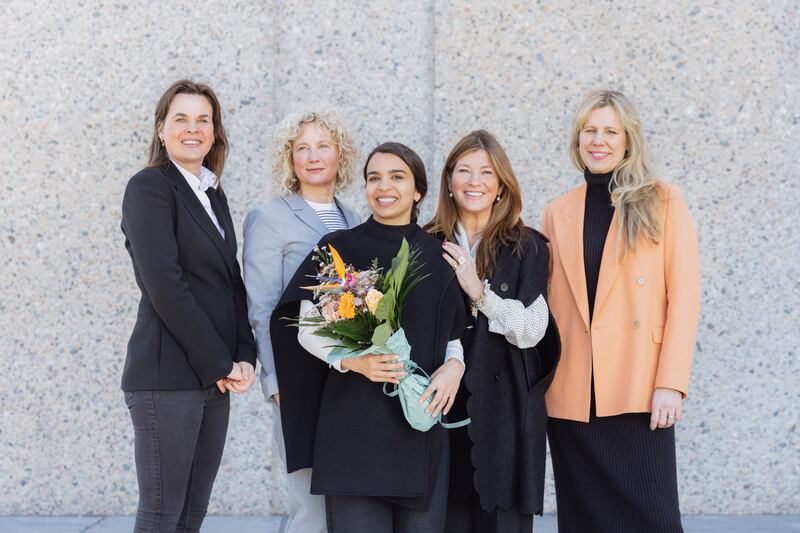Kuwaiti-Puerto Rican artist Alia Farid has won Norway's Lise Wilhelmsen Art Award worth $100,000.
The prize, awarded in collaboration with the country's Henie Onstad museum, also grants Farid an exhibition at the space and one of her works will be acquired for its permanent collection.
“This money will help me develop my practice and my studio,” says Farid, speaking to The National from New Orleans. “Having this endorsement allows me to engage with ideas for a longer period of time and in more sustained research.”
Farid, who lives in Kuwait and Puerto Rico, was in Louisiana on a residency programme hosted by the Rivers Institute for Contemporary Art and Thought. She is researching the environmental and social conditions around the Gulf of Mexico, which is increasingly prone to flooding due to climate change — taking her from the Gulf marshlands to institutional archives, such as that of the Amistad Research Centre at Tulane University in New Orleans. The records reveal a long history of racial discrimination in terms of which towns and areas of Louisiana have been given support and protection in the changing climate.
This nexus of ecology, history and politics has emerged as the lens through which Farid views her subjects, which tend to be concentrated in the other Gulf — the Arabian Gulf. Their modes of everyday life create a jumping-off point for her work, which unfurls into stories and connections to history.
“My work engages the aesthetics of the Gulf and its vernacular,” she says. “And how the past shows up in the present. It is a back-and-forth process.”
For her 2018 piece Contrary Life, a commission for the Jameel Arts Centre, Farid worked with Kuwaiti artist Aseel AlYaqoub to create a fantastical version of palm trees and other Gulf flora, rendered in odd heights and bright, colourful lights. It was at once a nod to the Khaleeji practice of covering trees with bright fairy lights and a way to highlight an ecology that many don’t associate with the Gulf.
A similar project went up at the Whitney Biennial last yeat, where tall, spiky, neon-coloured trees created an outdoor grove in the urban landscape.

“At the Whitney, the fake palm trees were stand-ins for the decimated palm forest in southern Iraq,” she says. “The majority of people associate the Arab region with the desert and that’s it, but there so much more."
The Iraqi marshlands, which also extend into Kuwait, have become a significant subject for the artist. In an ongoing series of sculptures she casts vessels used to store water in resin — producing them at gargantuan scale, like monuments to everyday sustainability.
The project, which made its debut in Farid’s solo show at the Kunsthalle Basel last year, gives equal weighting to both the traditional clay vessels, with their bulbous bodies and ear-like handles, and contemporary plastic water bottles, with their indents for easy gripping appearing like a thoughtful striped pattern.
Elsewhere at the Whitney Biennial, she showed a version of her film Chibayish, which juxtaposes an innocent world in the marshes with a dry, rubbish-strewn future.
Farid is the third recipient of the Lise Wilhelmsen Art Award, which marks a significant moment in an artist’s career. South American artist Guadalupe Maravilla, who lives in New York, won the award in 2021 and Nigerian artist Otobong Nkanga, who lives in Belgium, won the prize in 2019. Farid's exhibition at the museum is planned for 2024 and will be her first show in the Nordic region.
“Alia Farid's complex work mediates between the past and the present and, in a poetic processing, draws out omitted histories that push against standard narratives,” said the jury.
“She explores questions of conflict and control and how power and violence are inflicted on nature and people. We have high expectations for Alia Farid's further activities and believe LWAAP can contribute to her production and strong social commitment at a timely point in her artistic vocation.”







